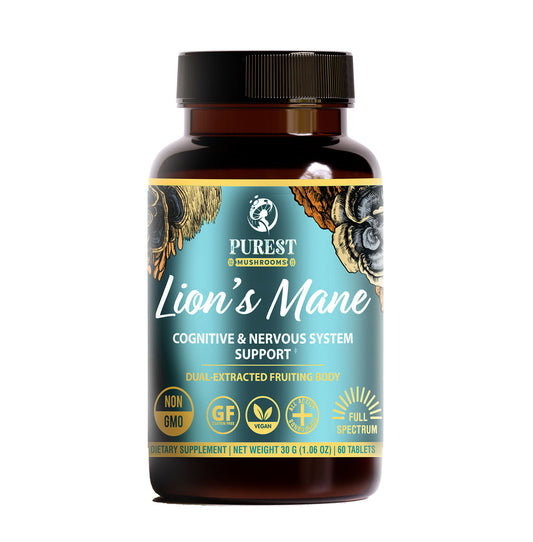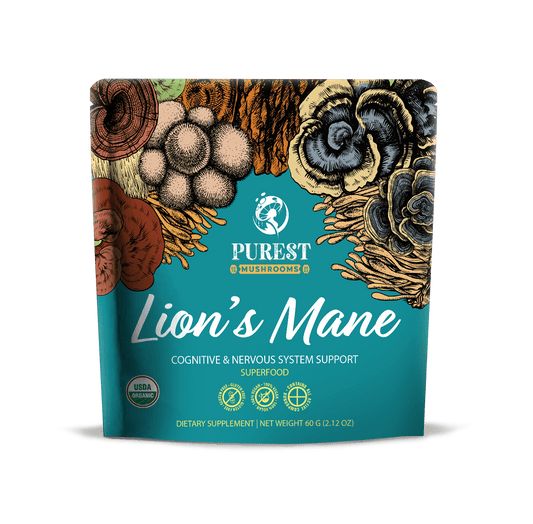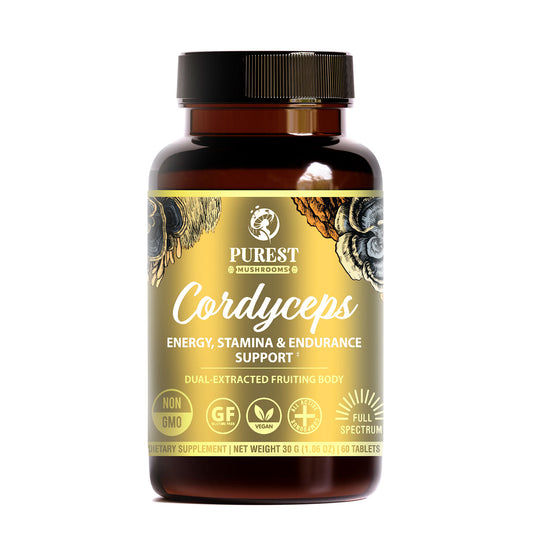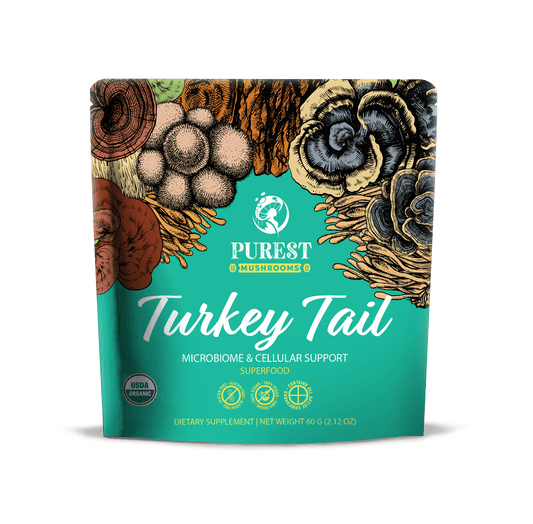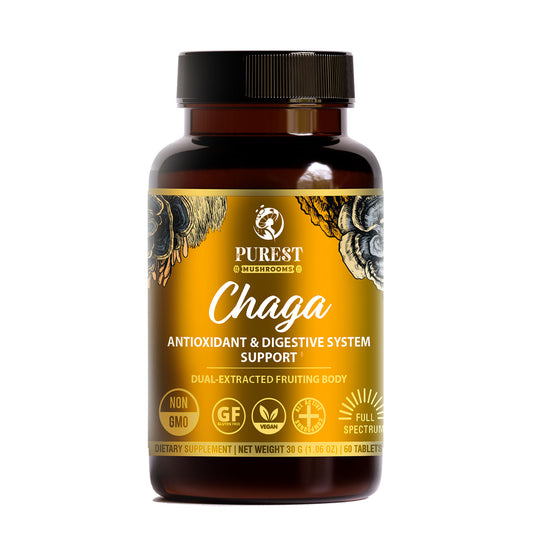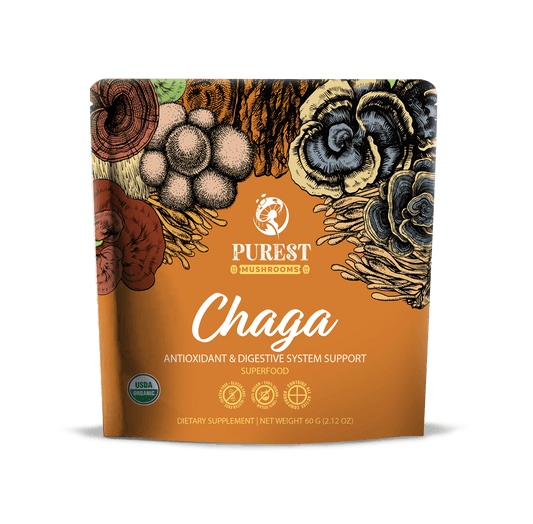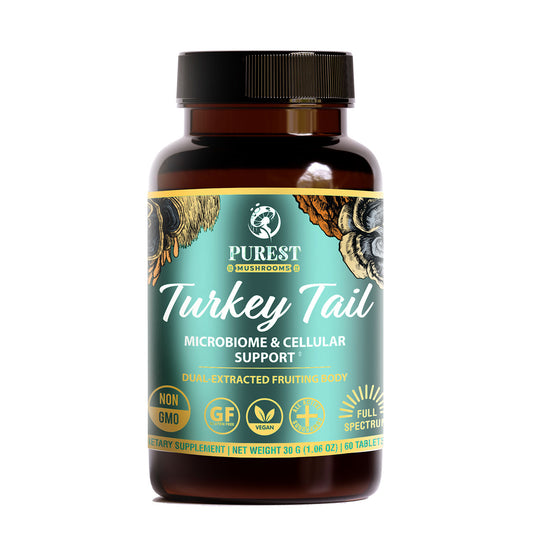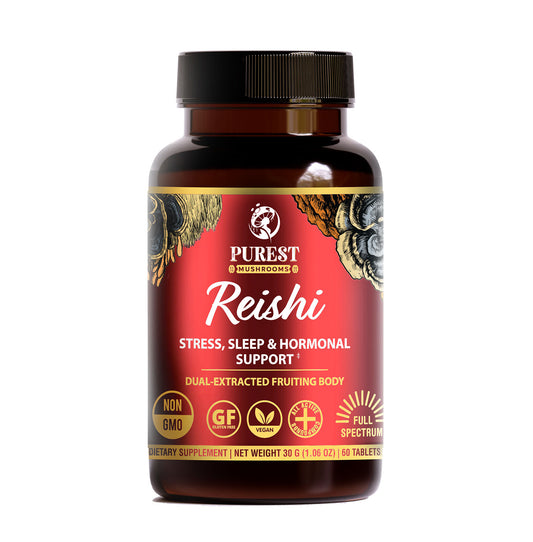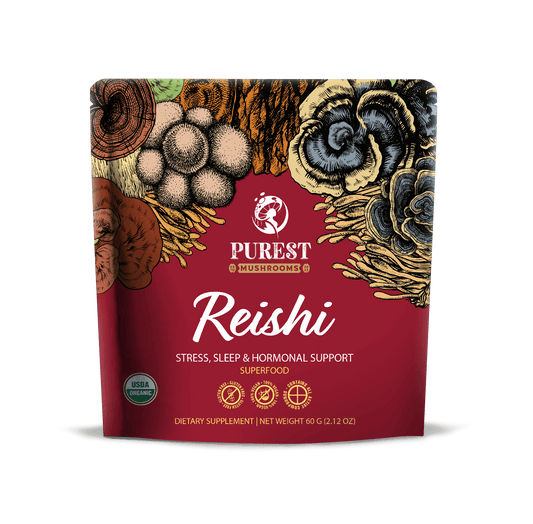Mushrooms, those fascinating and enigmatic organisms, have been cherished for centuries for their culinary and medicinal properties. In recent years, functional mushrooms have gained significant attention in the wellness world, thanks to their potential health benefits and the growing interest in natural remedies. But did you know that mushrooms also contain a wide array of active compounds that contribute to their incredible health benefits? In this article, we will delve into the depths of some of the most prominent active compounds found in popular mushrooms, such as Cordyceps, Chaga, Lion’s Mane, Reishi, and Turkey Tail. So, fasten your seatbelts as we embark on a captivating journey through the world of mushrooms and their active constituents.

Adenosine and Adenine - Cordyceps
Cordyceps, a mushroom with a rich history in traditional Chinese medicine, boasts an impressive duo of adenosine and adenine. Adenosine plays a pivotal role in energy metabolism, promoting the production of ATP (adenosine triphosphate) in our cells. By enhancing ATP synthesis, cordyceps supports our body’s energy levels, stamina, and overall vitality. Additionally, adenine, a purine nucleobase, contributes to the regulation of cellular functions and assists in DNA and RNA synthesis. Cordyceps’ adenosine and adenine content make it a remarkable adaptogen, providing a natural boost to our well-being.
Agaritine and Betulin - Chaga
Chaga, often referred to as the “King of Mushrooms,” harbors agaritine and betulin as its active compounds. Agaritine exhibits potent antioxidant properties, protecting our cells from oxidative stress and supporting a healthy immune system. Meanwhile, betulin, derived from the birch trees that chaga typically grows on, contributes to its therapeutic potential. Betulin possesses anti-inflammatory and antimicrobial properties, making chaga an invaluable ally for immune support and overall wellness.

Betulinc Acid - Chaga and Reishi
Both chaga and reishi mushrooms contain betulinc acid, an active compound known for its anti-tumor and anti-inflammatory properties. Betulinc acid exhibits the potential to inhibit tumor growth and stimulate immune responses, thus making chaga and reishi valuable components in the realm of natural cancer therapies. Additionally, the anti-inflammatory properties of betulinc acid contribute to its ability to support a healthy immune system and reduce chronic inflammation in the body.
Cordycepin and Uridine - Cordyceps
Cordycepin and uridine are two powerful compounds found in cordyceps that have garnered significant attention in recent years. Cordycepin exhibits antiviral and antimicrobial properties, aiding in the defense against infections. Moreover, it has shown potential as an anticancer agent, inhibiting the growth of cancer cells. Uridine, on the other hand, plays a crucial role in the synthesis of RNA and DNA and supports various cognitive functions, such as memory and learning. The combined effects of cordycepin and uridine make cordyceps an exciting mushroom with a diverse range of health benefits.

Erinacines and Hericenones - Lion’s Mane
Lion’s Mane, a visually striking mushroom resembling a lion’s mane, contains erinacines and hericenones as its active compounds. These compounds have demonstrated remarkable neuroprotective properties, promoting the growth and regeneration of nerve cells. As a result, Lion’s Mane is believed to enhance cognitive function, improve memory, and potentially offer therapeutic benefits for neurodegenerative disorders such as Alzheimer’s and Parkinson’s diseases. Lion’s Mane truly earns its place as a beloved mushroom for brain health.
Ergosterols and Ergothioneine - Chaga, Cordyceps, Lion’s Mane, Reishi, Turkey Tail
The mushrooms Chaga, Cordyceps, Lion’s Mane, Reishi, and Turkey Tail all share a commonality in their content of ergosterols and ergothioneine. Ergosterols are a type of sterol compound found in mushrooms, which can be converted into vitamin D when exposed to sunlight. Vitamin D is essential for bone health, immune function, and overall well-being. By consuming mushrooms rich in ergosterols, we can supplement our vitamin D levels naturally.
Ergothioneine, on the other hand, is a powerful antioxidant that plays a crucial role in cellular protection. It scavenges free radicals, reduces oxidative stress, and helps maintain the integrity of our cells. The presence of ergothioneine in these mushrooms contributes to their antioxidant properties and their potential to support longevity and overall health.
Ganodermic Acids A, B, C, & D - Reishi
Reishi, often revered as the “Mushroom of Immortality,” contains a group of compounds known as ganodermic acids. These acids, including ganodermic acids A, B, C, and D, possess potent anti-inflammatory, antitumor, and immunomodulating properties. They have been studied for their potential to inhibit tumor growth, enhance immune responses, and reduce inflammation in the body. Reishi’s ganodermic acids contribute to its reputation as a valuable mushroom for overall wellness and longevity.
Lupeol - Chaga
Another notable compound found in Chaga is lupeol, a triterpene with exceptional health benefits. Lupeol exhibits anti-inflammatory, antioxidant, and antimicrobial properties, making it a valuable ally in supporting a healthy immune system and reducing the risk of chronic diseases. Its ability to modulate inflammatory responses in the body contributes to Chaga’s overall anti-inflammatory effects, making it a go-to mushroom for promoting well-being.

Polysaccharide-K (PSK) and Polysaccharopeptide (PSP) - Turkey Tail
Turkey Tail mushrooms are renowned for their high content of polysaccharides, specifically Polysaccharide-K (PSK) and Polysaccharopeptide (PSP). These compounds have been extensively studied for their immunomodulatory effects. PSK and PSP enhance immune function by stimulating the activity of immune cells, improving the body’s defense against infections, and potentially supporting cancer treatment. They have shown promise in various studies, particularly in combination with conventional cancer therapies, as adjuvants in cancer treatment protocols.
Unveiling the Potential of Mushrooms
As we have journeyed through the fascinating world of mushrooms, we have discovered a multitude of active compounds that contribute to their remarkable health benefits. From cordyceps’ adenosine and adenine for energy and vitality to Lion’s Mane’s erinacines and hericenones for brain health, and from Chaga’s agaritine and betulin for immune support to Reishi’s ganodermic acids for overall well-being, each mushroom presents a unique array of compounds that can positively impact our health.
While further research is needed to fully understand and harness the potential of these active compounds, incorporating mushrooms into our diets or utilizing them as dietary supplements may offer an opportunity to enhance our well-being naturally. Whether it’s supporting our immune system, promoting cognitive function, or reducing inflammation, mushrooms hold immense promise as a treasure trove of natural compounds that can contribute to our overall health and vitality.
So, the next time you come across a mushroom, remember that it’s not just a delicious ingredient in your meal but also a potential source of active compounds that can unlock a world of wellness. Embrace the power of mushrooms and allow their natural wonders to enrich your life and promote your well-being from the inside out.
It’s important to note that while mushrooms have been used for centuries in traditional medicine and have shown promising results in scientific studies, they should not replace professional medical advice or treatment. If you have specific health concerns or conditions, it’s always best to consult with a healthcare practitioner before incorporating mushrooms or any new supplements into your routine.
Incorporating Mushrooms into Your Lifestyle: Now that you’re aware of the active compounds found in various mushrooms, you might be wondering how to incorporate them into your daily life. Here are a few suggestions: Culinary Delights: Mushrooms offer a wide range of flavors and textures that can elevate your culinary creations. Add sautéed or roasted mushrooms to your favorite dishes, such as stir-fries, soups, pasta, or omelets. You can also try experimenting with mushroom-based sauces or use powdered mushrooms as a seasoning.
Mushroom Extracts and Powders
If you’re looking for a more concentrated dose of the active compounds, consider incorporating mushroom extracts or powders into your routine. These are available in various forms such as capsules, tinctures, or powders that can be easily added to beverages or smoothies.
Mushroom Teas and Tonics: Enjoy the soothing and therapeutic benefits of mushrooms through teas and tonics. Many mushroom varieties, such as Chaga and Reishi, can be brewed into a delightful cup of tea. Look for high-quality mushroom tea blends or consider making your own by steeping dried mushrooms in hot water.

Supplements
If you prefer a convenient and standardized option, mushroom supplements are readily available in the market. When choosing a supplement, opt for reputable brands that prioritize quality and transparency in their sourcing and production processes.
Mushrooms are more than just a culinary delight; they are a treasure trove of active compounds that can contribute to your overall well-being. From Cordyceps to Chaga, Lion’s Mane to Reishi, and Turkey Tail, each mushroom offers a unique profile of active compounds with potential health benefits. As research continues to unveil the therapeutic properties of these mushrooms, it’s important to stay informed and make informed choices. Incorporating mushrooms into your diet or incorporating mushroom-based supplements can be a natural and exciting way to enhance your wellness routine. However, always consult with a healthcare professional before making any significant changes to your diet or starting a new supplement regimen. So, embrace the power of mushrooms and explore their potential to support your health. Unlock the secrets of these remarkable fungi and discover a world of wellness right at your fingertips.
Introduction to Mushrooms
Mushrooms have been a cornerstone of traditional Chinese medicine for centuries, revered for their ability to promote overall health and well-being. In recent years, functional mushrooms have surged in popularity, thanks to their potential health benefits, such as boosting the immune system and reducing inflammation. As interest in functional foods and dietary supplements grows, it’s crucial to understand the different types of mushrooms, their active compounds, and their potential effects on human health. Whether you’re looking to incorporate mushrooms into your diet for their nutritional value or seeking specific health benefits, consulting with a healthcare provider is essential to make informed decisions. Embrace the wisdom of traditional Chinese medicine and explore the world of functional mushrooms to enhance your overall health.
 The Active Compounds Within
The Active Compounds Within
Functional mushrooms are a treasure trove of active compounds, including polysaccharides, terpenes, and phenolic compounds, each contributing to their medicinal properties. For instance, reishi mushrooms are rich in ganoderic acids, known for their anti-inflammatory and antioxidant properties. Lion’s mane mushrooms, on the other hand, contain erinacines, which may stimulate nerve growth factor production and improve cognitive function. Understanding these active compounds can help you make informed decisions about which mushrooms to incorporate into your diet. Additionally, mushroom supplements are widely available in health food stores, but it’s vital to choose products from reputable manufacturers to ensure quality and safety. By doing so, you can harness the full potential of these remarkable fungi.
Health Benefits
The health benefits of functional mushrooms are both numerous and well-documented. Species like shiitake, chaga, and turkey tail have been shown to possess immunomodulatory effects, helping to regulate the immune system and prevent disease. Mushrooms such as lion’s mane and cordyceps exhibit adaptogenic properties, aiding the body in adapting to physical stress and promoting overall well-being. Furthermore, reishi and chaga mushrooms are renowned for their antioxidant and anti-inflammatory properties, which can help reduce inflammation and support gut health. While more human research is needed to confirm the specific health benefits of each mushroom species, existing evidence suggests that functional mushrooms can be a valuable addition to a healthy diet. Embrace the power of these natural wonders to enhance your overall health and vitality.
Safety and Risks
While functional mushrooms are generally considered safe, it’s important to be aware of potential risks and side effects. Allergic reactions can occur in some individuals, particularly those with pre-existing allergies. Additionally, certain mushrooms, like chaga, may interact with medications or exacerbate underlying health conditions. Therefore, it’s crucial to consult with a healthcare provider before adding any new supplements to your diet, especially if you have a pre-existing medical condition or are taking medications. The quality and manufacturing practices of supplement companies can vary significantly, so choosing products from reputable manufacturers is essential to minimize the risk of contamination or adverse effects. By taking these precautions, you can safely enjoy the benefits of functional mushrooms.
Incorporating Mushrooms into Your Diet
Incorporating functional mushrooms into your diet can be both easy and delicious. Many species, such as shiitake and lion’s mane, are available in whole food form at health food stores or specialty grocery stores. You can add them to soups, stir-fries, or salads for a nutritious and flavorful boost. Mushroom supplements, including powders or capsules, offer a convenient way to reap the benefits of functional mushrooms. However, it’s essential to follow the recommended dosage and consult with a healthcare provider before adding any new supplements to your diet. With a growing body of evidence supporting the health benefits of functional mushrooms, now is an exciting time to explore the world of medicinal mushrooms and discover the potential benefits they can offer for overall health and well-being.



